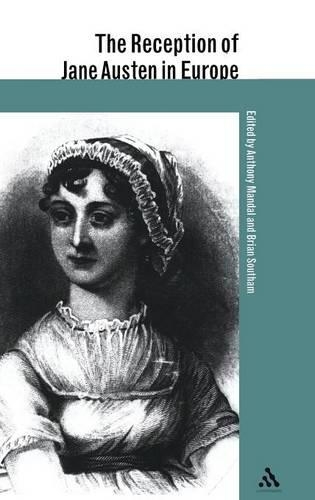
The Reception of Jane Austen in Europe
(Hardback)
Available Formats
Publishing Details
The Reception of Jane Austen in Europe
By (Author) Dr Anthony Mandal
Edited by Brian Southam
Bloomsbury Publishing PLC
Continuum International Publishing Group Ltd.
13th August 2007
United Kingdom
Classifications
Tertiary Education
Non Fiction
Literary studies: c 1800 to c 1900
823.7
Physical Properties
Hardback
464
Width 156mm, Height 234mm
300g
Description
This volume of international research provides a wide-ranging account of Jane Austen's reception across the length and breadth of Europe, from Russia and Finland in the North to Italy and Spain in the South. In historical terms, the survey ranges from the near-contemporary - since Austen's novels were available in French very soon after their original publication - to modern times, in those countries which for various reasons, linguistic, historical or ideological, have taken up the novels only in recent years. For many, Austen's novels are valued for their romantic content, as love stories, but increasingly they are being perceived as sophisticated, ironic narratives. In this, the quality of translation has been a significant factor and the many film and television adaptations have played an important part in establishing Austen's reputation amongst the public across two centuries. It will be seen from this that across Europe Austen's 'reception history' is far from uniform and has been shaped by a complex of extra-literary forces.
Reviews
In the age of 'global' Jane Austen...the study of her reception around the world and through the ages is becoming of increasing interest to her readers. For this reason this collection of essays...is extremely timely...Each contribution stands on its own, enabling readers to delve into the history of Austen's increasing popularity in a particular country, while the exhaustive timeline, which charts the pan-European reception of Austen from 1775 to the present day (a stroke of genius), and the introduction by Professor Mandal provide the all-important overview of the vast subject matter of the book. As we approach the two hundredth anniversary of the foreign reception of Austen's peerless novels, we are fortunate to be able to welcome this fine new contribution to the important tradition of scholarship that explores and assesses the amazing phenomenon of Austen's enduring legacy and universal fame. -- Elisabeth Lenckos * JASNA News: The Newsletter of the Jane Austen Society of North America, Winter 2008. Vol. 24 No. 3 *
As an empirical piece of research, this edition is faultless; however, its chief value lies in the stories it tells of British-European relations in the nineteenth and twentieth centuries, and of the new ground it opens up in terms of widening Austne scholarship.The Reception of Jane Austen in Europe proves again how complex this apparently straightforward writer is; it is not so much the case that Austen can or cannot 'travel'; simply that she has rarely made the journey untarnished. But the journeys have been many, and whether Austen was translated in her lifetime (France), or not until the 1960s (Russia), there is a story to be told. * Transnational Literature, May 2009 *
This substantial volume, in the editors' words, builds on 'earlier commentaries by providing, for the first time, a comprehensive account of Austen's reception across seventeen nations' (2007, 2). -- James Rovira * College Literature, Vol. 36, April 2009 *
The detailed scholarship in The Reception of Jane Austen in Europe makes this an impressive reference volume, with plenty of translation interest. * Tanslation and Literature *
Author Bio
Anthony Mandal is Reader in English Literature and Director of the Centre for Editorial and Intertextual Research at Cardiff University. His publications include Jane Austen and the Popular Novel: The Determined Author (2007) and a new scholarly edition of Mary Bruntons bestselling Regency novel, Self-Control (2014). He is also one of the General Editors of the New Edinburgh Edition of the Works of Robert Louis Stevenson. Brian Southam was an active figure in Austen studies, in which he played a formative role, until his death in 2010. Among his many books are Jane Austens Literary Manuscripts(1964, 1966, 2001), two volumes of Jane Austen: The Critical Heritage, 18111940 (1968, 1987) and Jane Austen and the Navy (2000, 2005). Elinor Shaffer, FBA, is Senior Research Fellow, Institute of Modern Languages Research, School of Advanced Study, University of London, and Director of the Research Project on the Reception of British and Irish Authors in Europe. The author of The Fall of Jerusalem: The Mythological School in Biblical Criticism and Secular Literature 1770-1880(Cambridge University Press), and Erewhons of the Eye: Samuel Butler as Painter, Photographer, and Art Critic (Reaktion), and many articles on Coleridges aesthetics and other topics in European Romantic studies, she was a founder member of the British Comparative Literature Association and editor of the annual journal Comparative Criticism(Cambridge), and has taught in universities in Britain, the United States and Europe.
